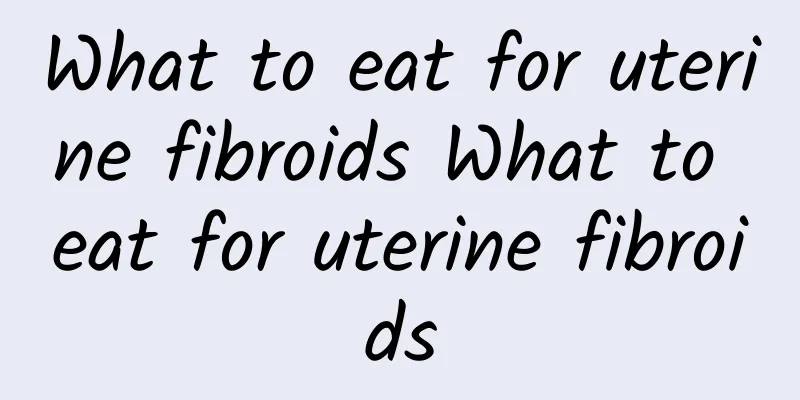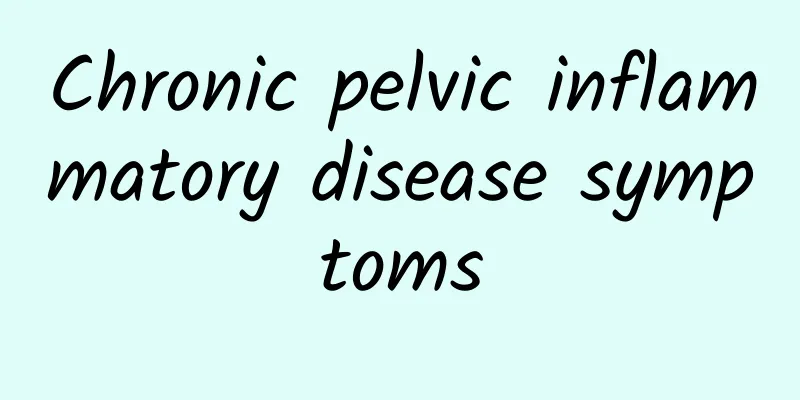What to eat for uterine fibroids What to eat for uterine fibroids

|
What foods are effective for uterine fibroids? What foods are helpful for uterine fibroids? Uterine fibroids are one of the common tumor types in the female reproductive system, which brings trouble and pain to many women. In addition to medical treatments, a proper diet can also play a certain auxiliary role in treating uterine fibroids. This article will introduce some foods that are effective for uterine fibroids to help women better take care of their health. 1. Fruits and vegetables Fruits and vegetables are rich in various vitamins and minerals, which have a positive effect on the treatment and prevention of uterine fibroids. For example, green vegetables such as spinach and lettuce have antioxidant and vitamin C properties, which can help reduce the risk of uterine fibroids. In addition, foods containing beta-carotene such as tomatoes and carrots are also considered to be helpful for uterine fibroids. 2. High-fiber foods High-fiber foods help eliminate excess estrogen from the body, thereby alleviating the symptoms of uterine fibroids. Fiber-rich foods such as whole grains, beans, and nuts should be an important part of your diet. In addition, you can also increase your fiber intake by eating foods such as peanuts, pomegranates, and garlic. 3. Protein Protein is an important component of body tissue and also has a certain impact on the treatment of uterine fibroids. Low-fat protein foods such as fish, chicken, tofu, etc. can provide the body with the nutrients it needs and relieve the symptoms of fibroids. 4. Calcium and Vitamin D Some studies have shown that women who take in the right amount of calcium and vitamin D can reduce the risk of uterine fibroids. Calcium-rich foods such as milk, soy products, and fish, as well as moderate sun exposure in the sun to supplement vitamin D are good choices. 5. Anti-inflammatory Foods Uterine fibroids are closely related to inflammatory responses, and eating foods with anti-inflammatory effects can help alleviate symptoms. Foods rich in anti-inflammatory ingredients such as ginger, blueberries, and fish oil can reduce the inflammatory response of fibroids and relieve symptoms such as dysmenorrhea. in conclusion: Through a reasonable diet, we can alleviate the symptoms and treatment effects of uterine fibroids to a certain extent. However, it should be emphasized that diet can only play a certain auxiliary role and cannot replace medical treatment measures. If you suspect that you have uterine fibroids or your symptoms are getting worse, please seek medical attention in time to obtain professional diagnosis and treatment. References: 1.AfeicheMC,etal.Dietaryintakeoffruitsandvegetablesandriskofuterinefibroids.AmJClinNutr,2008. 2.ChiaffarinoF,etal.Dietanduterinemyomas.ObstetGynecol,1999. 3.NairPP,etal.Diet,nutritionintake,andmetabolisminpopulationsathighandlowriskforcoloncancer.Dietaryfatintakeanditsrelationshiptocolonicpreneoplasia.AmJClinNutr,1984. |
>>: What are the symptoms of uterine fibroids? How to treat uterine fibroids?
Recommend
Why can exercise build muscle and reduce fat?
Muscles are the armor of the human body. If we us...
Here is what is the best time to have an abortion?
If you do not want to give birth to the child aft...
What are the symptoms of cervical hypertrophy in life
Many women suffer from cervical hypertrophy, but ...
How to lower cholesterol without medication? Nutritionist Lin Yuwei: 5 tips to adjust your lifestyle and improve your cholesterol
How to lower cholesterol without medication? Some...
What should you pay attention to before painless abortion surgery?
Things to note before painless abortion 1. Sexual...
No need to be picky anymore! Master these 4 tips and you can eat anything when reducing sugar intake
Many people avoid starch and fruit foods, or even...
Stick exercise for fat loss and body shaping? 4 Myths of Stick Exercise
Stick exercises are becoming popular. Many people...
Analyze the specific cause of vulvar leukoplakia
Clinically, the occurrence of vulvar leukoplakia ...
What is aggravated dysmenorrhea?
If women have worsening dysmenorrhea, especially ...
There are three main causes of ovarian cysts
Ovarian cyst is a common gynecological disease an...
Are there less harmful ways to have an abortion?
The choice of the less harmful method of abortion...
Can female ovarian cysts be cured? Surgery is necessary
Ovarian cysts are a common female disease. After ...
What should I do if my period has not come after three days?
What should I do if my period has not come for th...
What is the process of medical abortion? Medical abortion is divided into 5 steps
Medical abortion, also known as drug abortion, re...
Analysis of common causes of recurrence of pelvic inflammatory disease in women
The recurrence of pelvic inflammatory disease is ...









